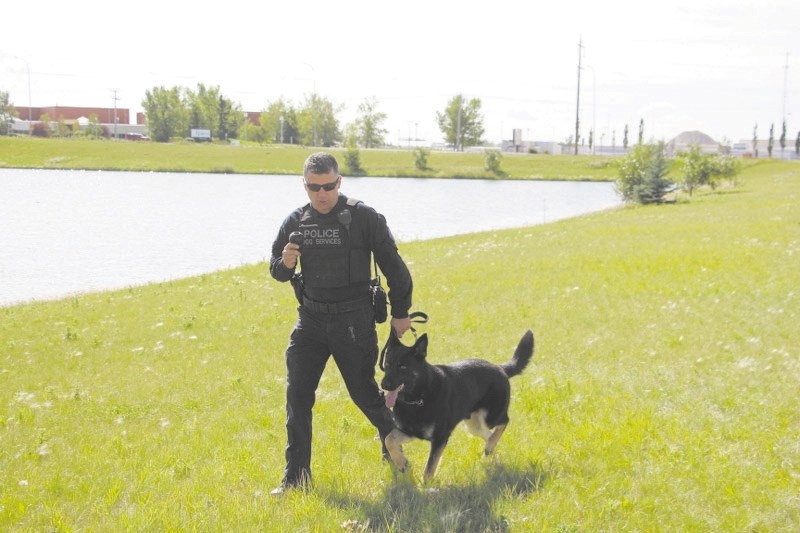With his ears up and his tail at attention, three-year-old German Shepherd Ecko is ready to do his job as a member of the RCMP’s Police Dog Services, along side his human partner, Corporal Mike Zinck.
Zinck is one of two officers based out of the Airdrie RCMP Detachment, tasked with serving a wide area including Rocky View County (RVC). The unit works as far west as the B.C. border, east to the Saskatchewan border, north to Red Deer and south to Nanton.
“I’ve been a police officer with the RCMP for about 23 years and I’ve been working as a dog handler in the Police Dog Service for about 14 years,” Zinck said. “We currently have two police dogs that service the Airdrie and surrounding area, with a third set to join us soon.”
Ecko is a product of the RCMP’s national Police Dog Service Training Centre located just outside Innisfail on Highway 2.
“That’s our national training centre for all RCMP police dogs, as well as for other federal and municipal police forces,” Zinck said.
Two different breeds are used in police work.
“We have a specialty or single profile dog – we use a Labrador Retriever – strictly for searching, generally for narcotics or drugs,” Zinck said. “We also have the German Shepherd that is a general duty police dog, so he’s trained in multiple profiles or police dog work.”
Ecko and Zinck have been partners for about a year and a half. Ecko took his place alongside Zinck when the officer’s previous dog, Storm, retired from the RCMP.
While Ecko lives with Zinck, the dog is no couch potato family pet.
“Working dogs are a little different in that they’re not pets. They don’t get to come in when it’s cold or wet outside. He has his secure kennel in the backyard that nobody can get in and he can’t get out,” Zinck explained. “He’s in there to rest and recuperate and be ready for the big call out.
“He does get to socialize a little bit but he doesn’t get to run the yard, he doesn’t get to run the house, doesn’t get the table scraps or sleep at the foot of the bed like most dogs do. He does get a lot of attention from me but he’s a working dog and he’s treated as such.”
A RCMP dog will start its training at between 12 to 18 months old, and most retire at the age of eight.
Once a dog retires from the RCMP, Zinck said they may be kept by their handlers as a pet or adopted by another family.
“It does take some education (of the new family). It’s not a one-day course they take. I adopted out my first two service dogs and it was probably a 12-month process of constant communication in preparation and some site visits to prepare (the new owner) both physically and mentally for taking care of a retired police dog.
“While the dogs are well trained and their training stays with them for life, for the most part they adapt very quickly to retirement. It’s a life all dogs would love to have and our dogs don’t get to have until retirement.”
The partners help other officers with a variety of calls for service.
“Typically, they’re serious criminal code or federal statute offenses,” Zinck said. “We get called to a lot of break and enters, stolen cars that get abandoned and suspects flee and run, assaults – whether they be domestic or common in nature – all the way up to homicides or attempted murders. Missing person searches is another one we get called to a lot.”
Ecko works on a reward system, earning praise or an opportunity to play with his favourite toy for his efforts.
“It’s all just a game of association for him. It’s lots of fun, high energy. It’s work, and sometimes it’s stressful work, but he doesn’t know that. It’s all one big game for him,” Zinck said.
According to information on the Police Service Dog Training Centre website, only 17 per cent of dogs that enter the RCMP training program succeed in becoming part of the Police Dog Services because of the high standards the force maintains.
A dog can search a car in approximately three minutes and work for up to four hours with some time off to rest. It’s a demanding job.
However, Ecko isn’t the only one who needs to be in good physical shape to do his job. Zinck said the job is very physically taxing on the human in the partnership.
“When the phone rings, you’re out of bed and into your uniform, into the truck with your dog and driving to wherever you need to drive to, to do whatever job you need to do. Sometimes you find yourself climbing a mountain in Kananaskis at three o’clock in the morning, in the pitch dark, stumbling down the rock faces or through the fields. Or climbing fences through backyards in the city.
“As long as my body allows me to do this job, I will. I absolutely love it and it’s more of a lifestyle than it is a job.”




